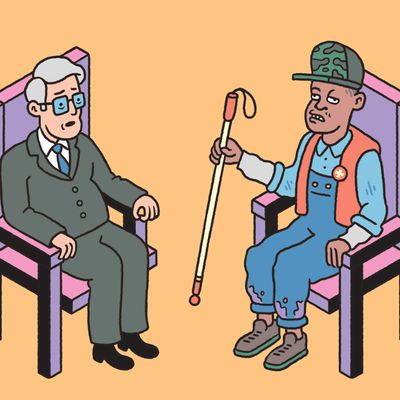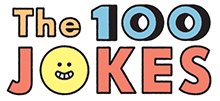
When the first episode of Chappelle’s Show aired in January 2003, audiences were blown away by an audacious Frontline parody about Clayton Bigsby, a blind black man who also happened to be a leader in the white-supremacy movement. Among the many offensive lines: “The message of my books is very simple: niggers, Jews, homo-sexuals, Mexican, A-rabs, and all different sorts of chinks stink, and I hate ‘em!” Created by Dave Chappelle and white comedian, actor, and director Neal Brennan, the nine-minute bit was an immediate hit among fans and remains a historically daring sketch. Vulture caught up with Brennan — whose one-man show 3 Mics will be coming to the Lynn Redgrave Theater March 3 — to discuss how the segment was inspired by Dave’s blind grandfather, Comedy Central’s reaction, and why they didn’t think it was any different from their other sketches.
What were the origins of the sketch?
It was based on Dave’s grandfather, who was mixed-race and blind. The day Martin Luther King got shot, apparently he was on a bus and a bunch of black dudes came up to him and were like, “What you doing on this bus, cracker?” and Dave’s grandfather apparently thought, Man, this cracker is in a lot of trouble, before he realized, Oh, I’m the cracker. Dave explained to me, “He’s a black guy who doesn’t know he’s black,” and it just never made sense. I never knew what he meant, and then he explained to me that the character went to boarding school, and that’s why he didn’t know. Nobody told him he was black. It came rushing in, like I completely got it immediately.
How did the concept evolve from that seed to the guy being a hero of the white-supremacist movement?
That was just the natural progression in sketch comedy. It’s like, “Well, then he’s the head of the KKK, isn’t he?” It’s obviously the most extreme way to go. Then ultimately you want to just do every different kind of joke you can do in terms of variations on it. Him explaining himself to the reporter at his house is one thing, and from there it’s like, “Well, he should yell at some white kids.” Him yelling at white kids and white kids being excited is funny, and then going to the rally and pulling the mask off is really funny.
And Dave introduced it by saying that he hadn’t been canceled yet but this sketch might do it, and that he showed it to a friend who looked at him like he had just set black people back with a comedy sketch.
Yeah, that was a guy named Cey Adams, who was the art director for Def Jam for, like, 15 years. He’s a black dude, and we showed it to him in editing, and he looked at us like, You guys are in trouble. He said, “This is like the time Horovitz [Ad-Rock from the Beastie Boys] said the N-word at the Apollo.” At the time we had a show at Caroline’s, and Dave used to show sketches during it. The audience hated that, by the way. They’d go for a stand-up show, and Dave would be like, I’m going to do ten minutes of stand-up, then I’m going to show some sketches, and they’d be like, Fuck you! — though I’m sure they all brag about it now. So Dave showed the sketch there one night, and it killed. Cey happened to be there, and when I saw him I gave a look like, Well? and he said, “Man, people will laugh at anything.”
When you were writing it, did you feel like it was going to have the impact that it did?
No! That was the thing. We never thought, This is going to be a banger. You just hope. That was back in the days before things went viral. They would go, like, spoken viral, whatever the fuck that’s called. There was no map, like, And then BuzzFeed’s going to pick it up.
Did you have a sense that it would push more buttons than some of the other sketches you were airing?
We didn’t, because it didn’t feel any more button-pushing than anything else we were doing. The next episode we had a white woman singing black thoughts. She said crack was invented and distributed to intentionally destroy the black community; AIDS was too. Every episode had something insane.
Looking back, do you think that the lack of information about who’s working on the show, and the absence of online critics and social-media users picking things apart the next day, gave you more comfort to do this?
Yeah, I’m glad that didn’t exist. I don’t think it would’ve helped. If everyone’s looking over their shoulders, it’s not going to make the stuff better.
Was Comedy Central concerned about the content at all?
Not really. I mean, obviously it’s inflammatory, but Comedy Central’s thing was If an intelligent, well-regarded black comedian is saying this stuff about race, it’s not our place to say, “Hey, wait!” which is a good policy. Their two biggest money-makers have been South Park and The Daily Show, the two most subversive shows of all time. So when people are like, “Did they mess with you guys?” I’m like, “No!” They’re better off when shit is inflammatory. It needs to be inflammatory for it to be successful in some ways.
That said, for some reason, Comedy Central didn’t want the sketch in the first episode because they didn’t think it was emblematic of the show. We were like, Wait, what? It’s entirely emblematic. It was just a really potent piece of comedy, if that makes sense. It was like Chris [Rock’s] niggers-versus-black-people bit where it’s searing. You can almost feel the ripple effect. It’s abrasive in the best possible way.


